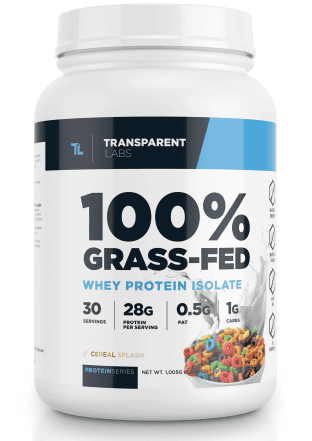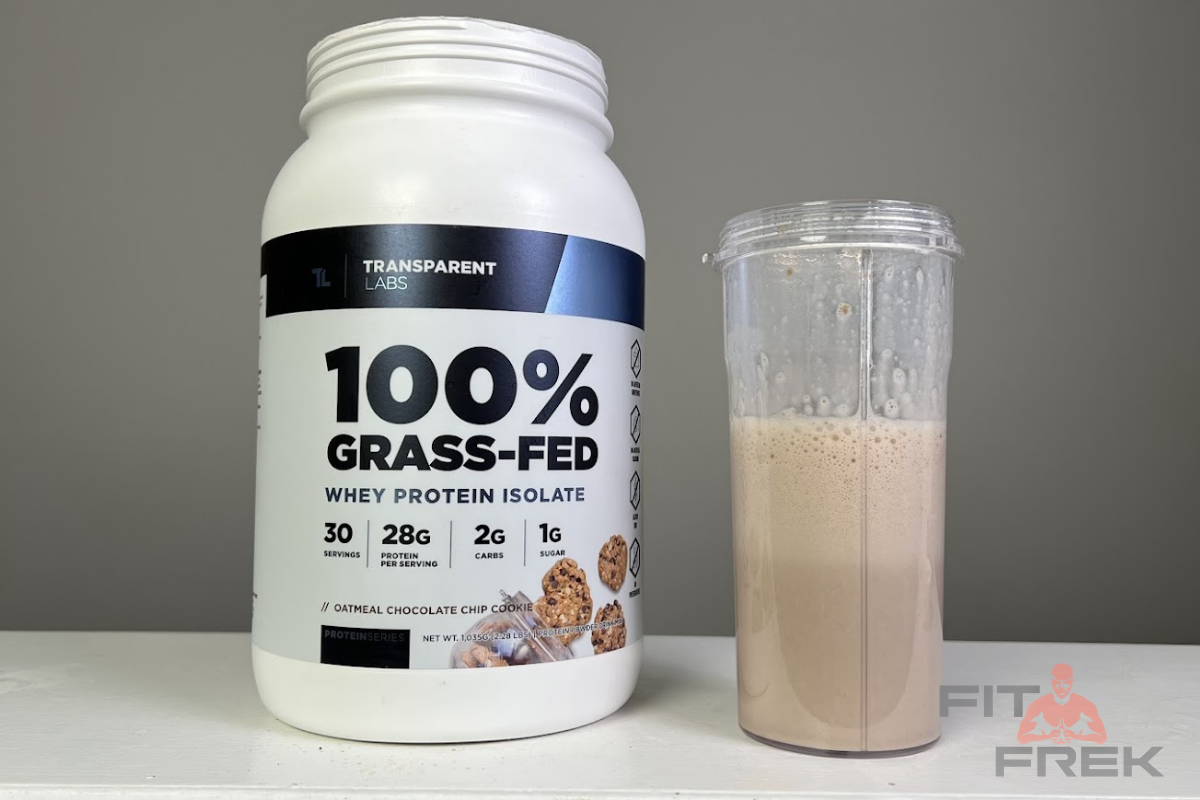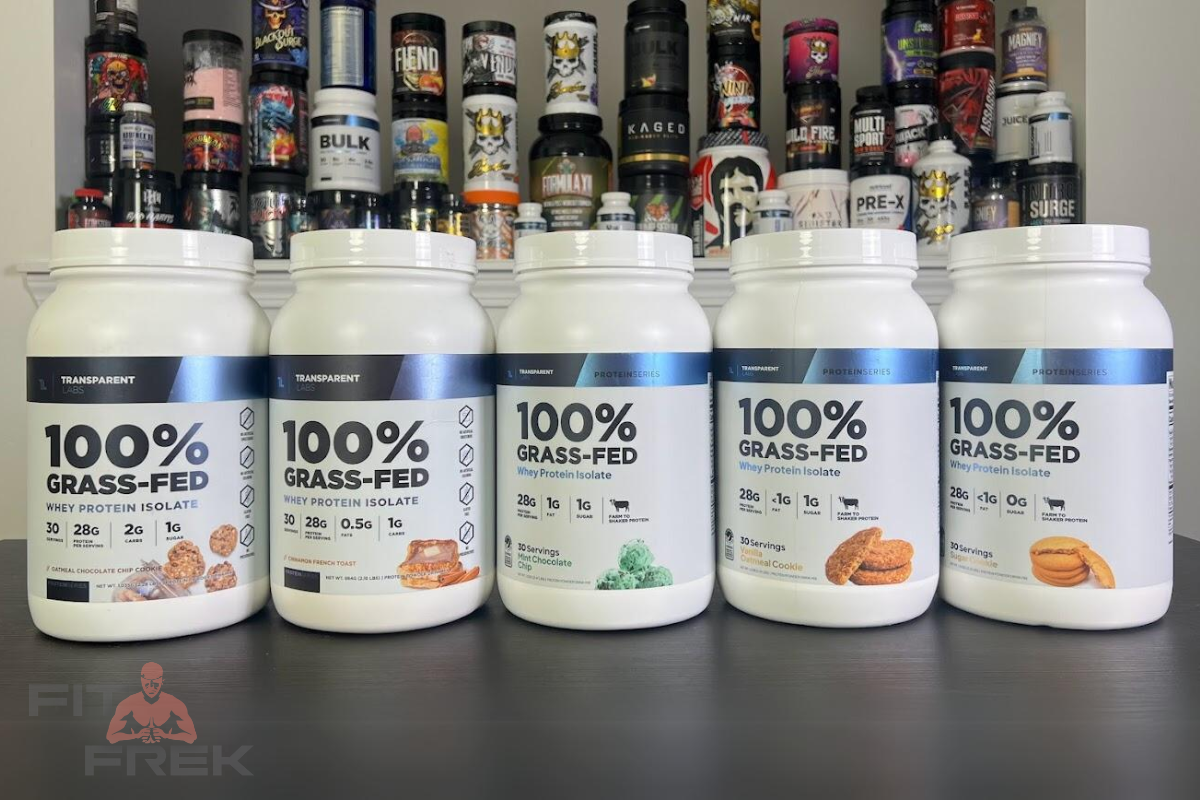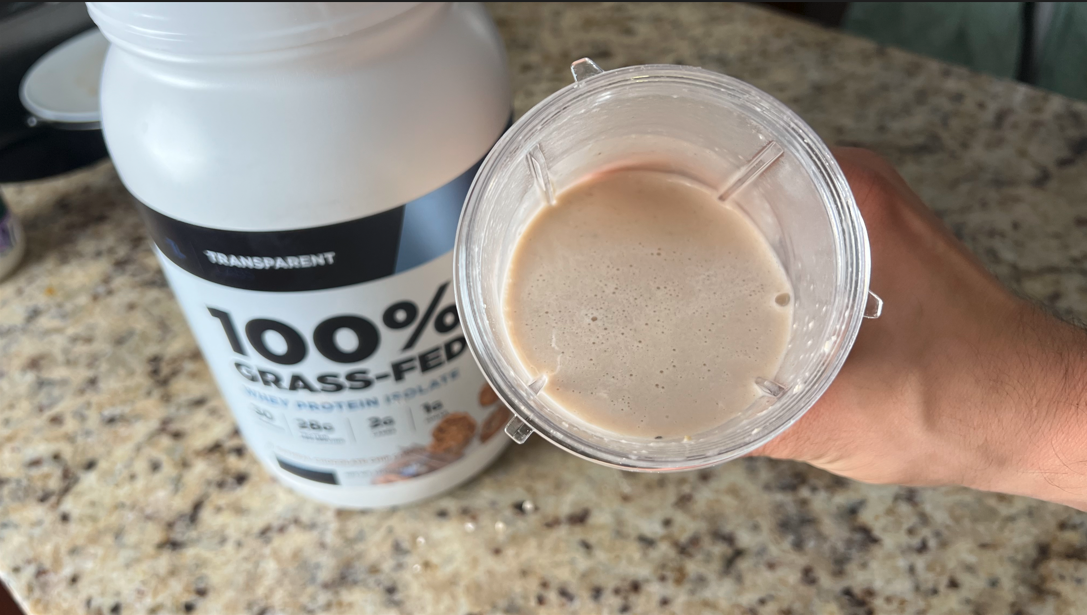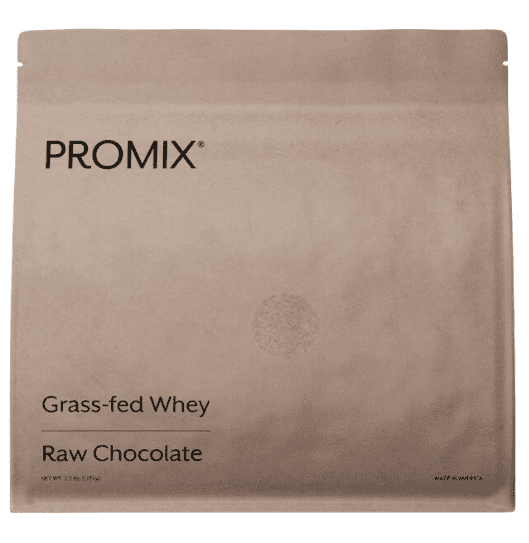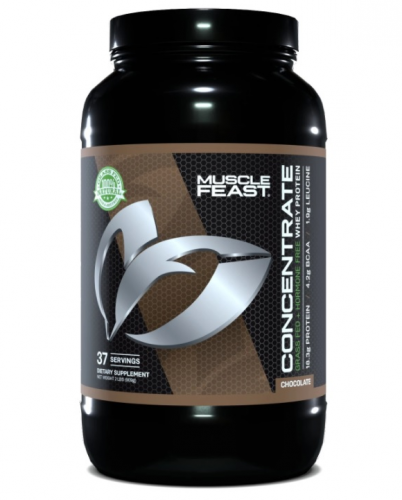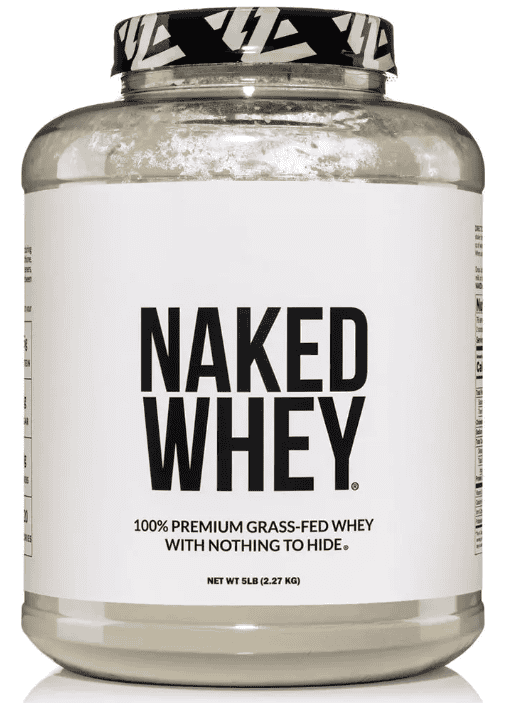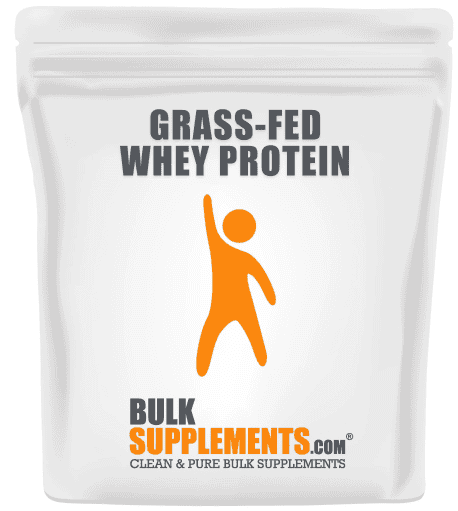Whey is processed from milk, the liquid part that’s separated from the milk.
It contains small amounts of lactose, even lactose intolerant can handle whey, specifically whey isolate.
All whey is rich in BCAA’s and proven to increase muscle protein synthesis, increases endurance, and decrease appetite.
You've undoubtedly heard about the benefits of grass-fed protein sources, from whey to dairy, beef and chicken against the conventional grain-fed kind.
Aside from grain-fed and grass-fed, there’s also organic whey.
But here we’re putting the spotlight on grass-fed whey.
Nutritional Quality Grass Fed Whey vs. Traditional
There's quite a difference between grass-fed whey vs conventional protein powder.
The difference starts with grass-fed cows because they are treated better, not only with their space but also with their food.
Grass-fed cows have an organic diet full of grass without being injected with steroids or hormones.
Their protein is high in nutrients like iron, CLA, and amino acids.
They also have higher contents of PUFA (polyunsaturated fatty acids) and MUFA (monounsaturated fatty acids).
Both of these types of fatty acids are shown to be helpful for reducing the risk of heart disease, reducing high blood pressure, and improving fat levels in the blood.
What Makes Grass-Fed Whey Protein Special?
When it comes to protein powders, not all are created equal. Grass-fed whey protein stands out from the crowd, and here's why:
Grass-fed vs Regular Whey Protein: The primary difference lies in the diet of the cows. Grass-fed cows are allowed to graze on natural grass, while regular whey comes from cows fed on grain. This difference in diet leads to variations in the nutritional profile of the whey protein produced.
Nutritional Profile: Grass-fed whey protein is rich in essential nutrients. It boasts higher levels of Omega-3 fatty acids, which are known for their heart health benefits and anti-inflammatory properties. It also contains more Conjugated Linoleic Acid (CLA), a fatty acid that aids in weight loss.
Benefits for Athletes and Bodybuilders: The high-quality protein in grass-fed whey supports muscle growth and recovery. It's a complete protein, meaning it contains all the essential amino acids your body needs. Plus, it's packed with branched-chain amino acids (BCAAs), which are crucial for muscle building.
The Research Behind Grass-Fed Whey Protein
There's a solid body of research supporting the benefits of grass-fed whey protein:
Muscle Growth and Recovery: Studies have shown that whey protein promotes muscle growth, especially when consumed after a workout. The high-quality protein in grass-fed whey provides the amino acids necessary for muscle repair and growth.
Nutritional Benefits: Grass-fed whey protein is rich in Omega-3 fatty acids and CLA, both of which offer numerous health benefits. Omega-3s are known for their heart health benefits and anti-inflammatory properties. CLA has been linked to weight loss and improved body composition.
Essential Amino Acids: Grass-fed whey protein is a complete protein, meaning it contains all the essential amino acids your body needs. These amino acids are crucial for various bodily functions, including muscle building and recovery.
Understanding the Different Types of Whey Protein
There are several types of whey protein available in the market.
These include concentrate, isolate, and hydrolysate.
Each type has its own set of benefits and drawbacks.
How to Choose the Best Grass-Fed Whey Protein
Choosing the best grass-fed whey protein can be a daunting task.
But don't worry, we've got you covered.
In the next section, we'll provide a guide on how to choose the best product for your needs.
Guide to Choosing the Best Grass-Fed Whey Protein
When choosing a grass-fed whey protein, consider the following factors:
- Source of the Whey: Ensure that the whey is sourced from grass-fed cows. This ensures that the product is free from hormones and antibiotics.
- Types of Whey: Decide whether you want a concentrate, isolate, or hydrolysate. Each type has its own benefits and drawbacks.
- Additional Ingredients: Check for any additional ingredients. Avoid products with artificial additives or sweeteners.
- Price: Consider your budget. While grass-fed whey protein can be more expensive than regular whey protein, there are still affordable options available.
- Taste and MixabilityChoose a product that you enjoy the taste of and that mixes well.
Grass-Fed Dairy vs Regular Dairy
Grass fed sounds like the solid choice.
But is it?
Grass fed beef and milk contain benefits in the fat.
Processing the milk removes the fat.
The amino acid profile is left after processing, and even if cows have the healthiest diets, it doesn't change the amino acids.
Grass fed cows are perhaps treated better, but processing removes the added content that make it special like omega 3's and CLA [1], [2], [3].
Fat-free protein powder, like concentrate, is especially no different when it comes to grass fed choices.
Grass fed concentrate has the most fat, but is it really healthier?
Consider this, each scoop has around 3g of fat and 5 percent of that is polyunsaturated fatty acids like omega 3's, nowhere near the levels of fish oil.
Omega 3 probably won't be used by the body because the protein powder must be kept in the fridge, covered, in the dark or it would be oxidized during shipment and consumption and processing.
Oxidized omega 3's have no effect on health, positive or negative.
CLA is what's left, a healthy trans-fat.
However one study found grass fed dairy to only have 2 percent CLA, higher than regular dairy but per scoop of whey concentrate, you'll only have 0.06 grams of CLA.
And the proper recommended dose is around 3g.
The other thing is that cows are crowded in concentrated animal feeding operations that are mass fed in feedlots.
They are fed either grains of soy or corn and are injected with antibiotics to be free of diseases.
They are also commonly injected with hormones and steroids to increase growth and meat output.
Grass fed cows are free roaming, eat naturally grown grass but the downside is that this is more expensive for farms to maintain because of the land and work required.
These types of cows don't require antibiotics to avoid disease nor are they injected with steroids, which are both harmful to humans in dairy products.
Protein Processing: Cold vs Hot
When it comes to manufacturing practices, you'll see a few terms being tossed around.
Some include:
- Cold processed
- Undenatured
- Cold processed
- Low-temperature drying techniques
- Micro-filtered
- Ultra-filtered
- And more
The typical consumer knows some type of filtering or processing is good to see.
But there's a difference between heat and cold processing that makes a big difference in the nutritional value.
Some countries require heat to be used in processing dairy-related products, however, heat processing destroys chemical properties and can make protein form into a cluster.
Studies have found heat processing to alter the taste of protein powders as a study showed an increase of sulfur flavor in whey as well as higher contents of aldehydes and ketones, and sulfur compounds. [4]
This is why some grass-fed protein powders state whey was made without acid or bleach processing.
Heat processing leads to lower amino acid content along with the reduction of many nutrients.
And cold processing has just as an effective treatment for harmful pathogenic microorganisms [5].
And on top of that, the flavor is better when it's cold-processed [6].
Frequently Asked Questions about Grass-Fed Whey Protein
What is grass-fed whey protein?
Grass-fed whey protein is a type of whey protein that comes from cows that have been fed on grass rather than grain. This results in a more nutritious product that is free from hormones and antibiotics.
Why should I choose grass-fed whey protein over regular whey protein?Grass-fed whey protein is a healthier option compared to regular whey protein. It's higher in essential nutrients and is free from hormones, GMOs, and pesticides. Plus, it's more environmentally friendly as grass-fed cows have a lower carbon footprint than grain-fed cows.
What are the benefits of grass-fed whey protein?Grass-fed whey protein is packed with benefits.
It's high in essential amino acids, which are the building blocks of protein and are crucial for various bodily functions.
It's also high in other nutrients such as omega-3 fatty acids and conjugated linoleic acid (CLA), which have been linked to various health benefits.
How can I incorporate grass-fed whey protein into my diet?Incorporating grass-fed whey protein into your diet is easy.
You can add it to your smoothies, shakes, or even your baking recipes.
It's a great way to boost your protein intake, especially if you're an athlete or bodybuilder or if you're just looking to improve your overall health and wellness.
Are there any side effects of grass-fed whey protein?Grass-fed whey protein is generally safe for most people.
However, some people may experience digestive issues such as bloating, gas, or stomach cramps.
This is usually due to lactose, a sugar found in milk and milk products.
If you're lactose intolerant, you may want to opt for a lactose-free whey protein.
As always, it's best to consult with a healthcare professional before starting any new supplement regimen.
Is grass-fed whey protein better than regular whey protein?
Grass-fed whey protein has a slightly different nutritional profile than regular whey, with higher levels of Omega-3 fatty acids and CLA. However, both types provide high-quality protein that supports muscle growth and recovery.
What are the benefits of grass-fed whey protein?
Grass-fed whey protein is rich in essential nutrients, supports muscle growth and recovery, and is a more sustainable choice. It's also typically free of hormones and antibiotics.
Is grass-fed whey protein worth the extra cost?
Whether grass-fed whey protein is worth the extra cost depends on your individual needs and values. If you prioritize nutrition, sustainability, and animal welfare, it may be worth the investment.
How do I choose the best grass-fed whey protein?
Look for products that have been third-party tested for quality and purity. Check the nutrition labels and ingredients list, and consider the reputation of the brand.
Can I use grass-fed whey protein if I'm lactose intolerant?
Grass-fed whey protein still contains lactose, so it may not be suitable for those with lactose intolerance. However, some brands offer lactose-free or low-lactose options. Always check the label or consult with a healthcare professional if you're unsure.
Is grass-fed whey protein suitable for vegetarians?
Yes, whey protein is derived from milk, so it's suitable for vegetarians. However, it's not suitable for vegans as it's an animal product.
Does grass-fed whey protein taste different from regular whey protein?
The taste of grass-fed whey protein can vary depending on the brand and flavor. Some people find it has a slightly creamier taste compared to regular whey protein.
How often should I take grass-fed whey protein?
The frequency of protein supplementation depends on your individual protein needs, which can be influenced by factors such as your body weight, activity level, and fitness goals. It's generally recommended to consume protein throughout the day, and whey protein can be a convenient way to boost your protein intake, especially post-workout.
Can grass-fed whey protein help with weight loss?
Protein is known to support weight loss by promoting feelings of fullness, which can help control appetite and reduce calorie intake. However, it's important to remember that whey protein is not a magic bullet for weight loss and should be part of a balanced diet and exercise program.
Is grass-fed whey protein safe for everyone?
While whey protein is generally safe for most people, it can cause digestive issues in some individuals, especially those who are lactose intolerant. If you have a milk allergy, you should avoid whey protein. As always, it's best to consult with a healthcare professional if you have any concerns.








